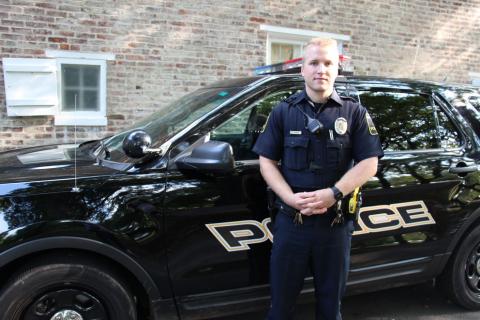
On the evening of Sept. 16, an emergency dispatcher requested assistance at a local fast food restaurant in Spring Township, Berks County, for the report of a cardiac arrest related to a suspected opioid overdose.
University Police Officer C. Luke Shivery at Penn State Berks happened to be on patrol just a short distance away and knew that police officers with the Township of Spring Police Department were on the scene of a crash elsewhere, so he told the dispatcher he would respond. Law enforcement agencies routinely assist each other with calls for service.
Upon arrival, an off-duty emergency medical technician (EMT) was removing the patient from a vehicle. Shivery retrieved an automated external defibrillator (AED), medical bag and naloxone kit from his patrol car. As Shivery prepared the naloxone for administration, the EMT administered CPR using a bag valve mask from Shivery’s medical bag. Shivery then administered a dose of naloxone, which is used for emergency treatment in suspected opioid overdose cases. As Shivery updated the dispatcher, the EMT administered a second dose of naloxone.
Spring Township police then arrived along with Township of Spring Fire Department and City of Reading Fire Department Emergency Medical Services, taking over medical assistance. The patient was placed into an ambulance where he was conscious and speaking.
“I’m definitely happy with the outcome. It’s a relief to know that things worked out well,” Shivery said, reflecting on the incident.
Shivery was the first officer with University Police to administer naloxone.
In 2017, after police stations at 22 Penn State campuses merged as one department under University Police and Public Safety, Penn State standardized first aid training through which police officers became first aid certified by the American Red Cross. Penn State also standardized first aid equipment for officers, which includes medical bags and AEDs.
Additionally, officers received training to administer naloxone, which is used for emergency treatment in suspected opioid overdose cases. The training included online and in-person training by certified first aid instructors.
University Police then began the process of equipping its police officers with naloxone. Currently, seven campus police stations are equipped with naloxone, including Beaver, Berks, Brandywine, DuBois, Behrend, Great Valley and University Park. Administrators continue to work with local and county agencies to equip officers with naloxone at the remaining campuses.
“We understand that we are a microcosm of our communities and the abuse of opioid products can spill over, at times, into our police officers’ jurisdiction, therefore we believe it is important to equip our officers with life-saving tools should they face a life-threatening situation,” said Charlie Noffsinger, assistant vice president of University Police and Public Safety at Penn State.